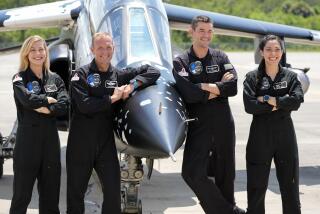SpaceX ready to resupply space station
Hawthorne-based rocket maker SpaceX is poised to return to the International Space Station with its Dragon spacecraft to carry out the first contracted cargo resupply flight in NASA’s history.
SpaceX performed a successful demonstration mission to the space station in May, showing NASA that the company could do the job. SpaceX has secured a $1.6-billion contract to carry out 12 such cargo missions, and Sunday’s mission would be the first.
SpaceX’s Falcon 9 rocket is set to blast off at 8:34 p.m. EDT Sunday from Space Launch Complex 40 at Cape Canaveral, Fla., carrying the Dragon capsule packed with 1,000 pounds of food, water and supplies.
“I’m still quite nervous about it because it’s just our second mission to the station,” Elon Musk, SpaceX’s 41-year-old billionaire founder and chief executive said. “We’re hoping that this mission goes as smoothly as the last one.”
With last year’s retirement of the space shuttle fleet, NASA is eager to give private industry the job of carrying cargo and crews, in hopes of cutting costs. Meanwhile, the space agency will focus on deep-space missions to land probes on asteroids and Mars.
Another aerospace firm, Orbital Sciences Corp. of Dulles, Va., is nipping at SpaceX’s heels with a test flight of its commercial rocket set for later this year. Orbital has a $1.9-billion cargo-hauling contract with NASA. The company is running tests on its Antares rocket at a launch pad at NASA’s Wallops Flight Facility in Virginia for a separate resupply mission.
Critics, including some former astronauts and members of Congress, have voiced concerns about NASA’s move toward private space missions. They contend that private space companies are risky ventures with unproven technology and say that the missions should be handled by NASA flight-proven hardware.
But SpaceX, formally known as Space Exploration Technologies Corp., has quieted many opponents after its successful demonstration mission, though it still faces opposition.
“A SpaceX failure back then, or indeed a slip-up on the next launch, would give ammunition to congressional critics, who in many cases are trying to bring home the bacon for their own constituents,” said Tim Farrar, president of the consulting and research firm Telecom, Media & Finance Associates Inc. in Menlo Park, Calif. “Continued success on SpaceX’s part makes it much harder to argue for continuing to invest in traditional contracts.”
During that nine-day demonstration, the Dragon spacecraft rendezvoused with the $100-billion space station and tested sensors and processors by linking up with the orbiting outpost’s onboard computers.
The crew aboard the space station snagged the spacecraft with a robotic arm and led it in for docking. It was later released and sent back to Earth.
Orbital Sciences has not yet made the maiden flight of a fully operational Antares rocket or a demonstration mission to the space station with its unmanned Cygnus cargo-carrying spacecraft. But company officials said the firm intended to complete required milestones over the next several months.
“Our pad operations are commencing immediately in preparation for an important series of ground and flight tests,” company Chief Executive David W. Thompson said in a statement.
Orbital has a $1.9-billion contract with NASA for eight resupply flights. But it does not have an astronaut-capable version of Cygnus in the works.
Meanwhile, SpaceX won a $440-million contract from NASA in August to develop its capsule to carry astronauts. Company officials say the upcoming cargo missions will yield valuable flight experience toward accomplishing this goal by 2015.
Founded in 2002, SpaceX makes the Dragon and Falcon 9 at a sprawling facility in Hawthorne that was once used to assemble fuselage sections for Boeing 747s. Once ready for the launch pad, SpaceX’s hardware from Hawthorne is put on a big rig and trucked to Cape Canaveral.
More to Read
Inside the business of entertainment
The Wide Shot brings you news, analysis and insights on everything from streaming wars to production — and what it all means for the future.
You may occasionally receive promotional content from the Los Angeles Times.











